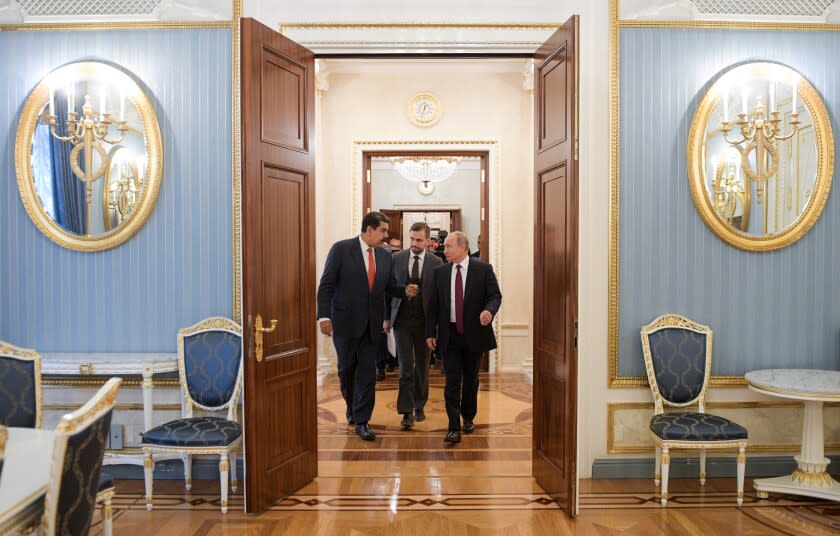Increasingly isolated, Putin finds a few allies in Latin America

- Oops!Something went wrong.Please try again later.
- Oops!Something went wrong.Please try again later.
Facing condemnation from most of the world and stiff sanctions from Europe and the United States, Russia appears increasingly isolated as its president presses on with his invasion of Ukraine.
But Vladimir Putin has found some measure of support in Latin America from the authoritarian governments of Venezuela, Cuba and Nicaragua.
In a televised speech this week, Venezuelan President Nicolás Maduro denounced U.S. sanctions against Russia as a “crime” against its people and said that he had just spoken with Putin and noted “serenity, wisdom and moral conviction.”
In an effort reminiscent of the Cold War, when Latin America was an ideological battleground for the Soviet Union and the United States, Russia has been trying to expand its influence in the region for more than a decade.
The pandemic provided one broad opportunity. Russia developed one of the first COVID-19 vaccines and delivered it to Argentina, Bolivia and to other countries that had limited access to other options.
Trade between Russia and Latin America has also been growing, though it barely registers compared with China’s economic footprint in the region.
“Russia has an interest in meddling in what has traditionally been considered a U.S. sphere of influence,” said Cynthia Arnson, director of the Latin American Program at the Wilson Center in Washington.
Putin’s biggest inroads have come with governments that have bad relationships with the United States.
Russia has granted Cuba — which had been the Soviet Union’s staunchest ally in the region — massive debt relief, forgiving $32 billion of Soviet-era debt in 2014. It has also sent hundreds of thousands of barrels of oil during shortages.
Russia has also been a lifeline for Venezuela, supplying it with billions of dollars in arms and investing in its oil industry after Hugo Chavez became president in 1999 and embraced socialism.
That support has continued under Maduro. In 2019, as he was fighting a U.S.-backed effort to oust him from power, Russia sent specialists to service military equipment.
In Nicaragua, Russia has opened an anti-narcotics training center and sold the government military tanks.
When the United States suspended aid to Nicaragua because of concerns of fraud in local elections in 2008, Russia paraded warships off the coast in an apparent show of support.
Russia also came to the defense of President Daniel Ortega — a former guerrilla leader backed by the Soviet Union — after many governments refused to recognize his reelection last year because his government had jailed his potential political challengers.
Russian Foreign Minister Sergei Lavrov held a news conference saying the election was “held in an orderly manner, in full compliance with Nicaraguan legislation.”
Ryan Berg, a senior fellow at the Center for Strategic and International Studies, a think tank in Washington, said Venezuela, Cuba and Nicaragua “can’t really afford to lose one of their biggest patrons.”
In the days before the invasion of Ukraine, Russian Deputy Prime Minister Yury Borisov visited Nicaragua, Cuba and Venezuela — a trip that experts say was an attempt to demonstrate his country’s international clout as it prepared for war.
Still, when it came to the United Nations General Assembly vote this week calling on Russia to immediately withdraw its troops, the three countries stopped short of offering Putin their full support.
Nicaragua and Cuba abstained. Venezuela could not vote because it had not paid its member dues.
Experts said Nicaragua and Cuba made a calculation that they had too much to lose by joining Russia, Belarus, Syria, North Korea and Eritrea as the only countries to vote against the resolution. Cuba in particular did not want to “burn all its bridges” with the United States, said Vladimir Rouvinski, a political scientist at Icesi University in Colombia.
During the administration of President Obama, the countries restored diplomatic relations. Cuba would like the United States to ease sanctions that limit remittances to the island.
Still, Jennie Lincoln, a senior advisor on Latin America at the Carter Center think tank, called the abstentions “a kick in the shins to the U.S.” and “a way of expressing their anti-imperialist view of the West.”
Apart from abstentions from El Salvador and Bolivia — also places where anti-U.S. sentiment runs high — the rest of Latin America supported the U.N. resolution.
Notably, the two most populous countries in the region, Brazil and Mexico, have not been unequivocal in their condemnation of Russia.
Brazilian President Jair Bolsonaro, who had met with Putin in Moscow days before the invasion to discuss trade relations, said this week before the U.N. vote that his country would remain neutral, and disparaged Ukrainian President Volodymyr Zelensky, a former comic who has rapidly turned into a war hero.
Ukrainians had “placed the hope of their nation in the hands of a comedian,” he said.
Mauricio Santoro, a political scientist at the State University of Rio de Janeiro, said Bolsonaro, who is running for reelection, may have been appealing to far-right supporters. “Many of them are also supporters of Putin because they perceive Putin to be a real model for a conservative leader,” he said.
Mexican President Andrés Manuel López Obrador said this week that Mexico will not issue economic sanctions against Russia “because we want to maintain good relations with all the governments of the world and want to be able to talk to the parties in the conflict.”
Trade between Mexico and Russia topped $2.1 billion in 2019, according to the Growth Lab program at Harvard University.
At rallies attended by dozens outside the Russian Embassy in Mexico City, Mexicans and Ukrainians have called on López Obrador to take a stronger position.
Rodrigo Jara, a 25-year-old Mexican music producer whose girlfriend is Ukrainian, said at a gathering Monday night that the Mexican president’s stance was “practically neutral.”
This story originally appeared in Los Angeles Times.

